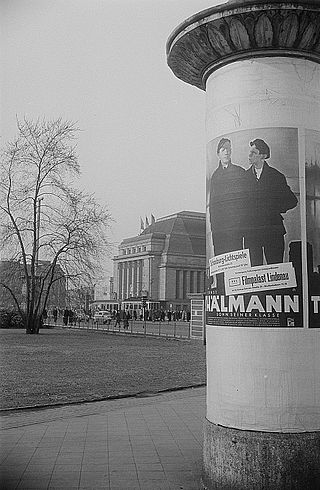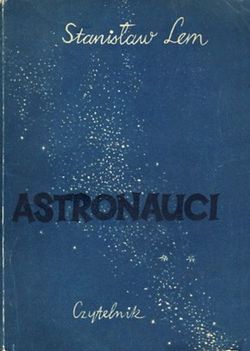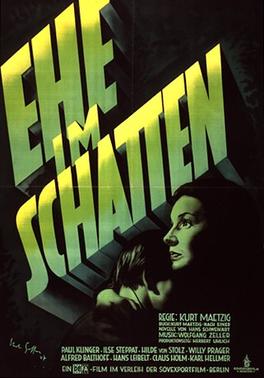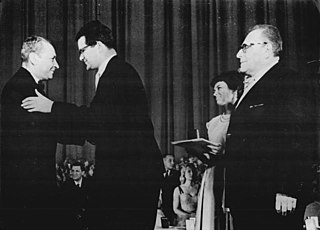Related Research Articles

Ernst Thälmann is an East German film in two parts about the life of Ernst Thälmann, leader of the Communist Party of Germany during much of the Weimar Republic, directed by Kurt Maetzig and starring Günther Simon in the title role. The first part, Ernst Thälmann - Sohn seiner Klasse, was released in 1954. It was followed by the 1955 sequel. Ernst Thälmann - Führer seiner Klasse.

Kurt Maetzig was a German film director who had a significant effect on the film industry in East Germany. He was one of the most respected filmmakers of the GDR. After his retirement he lived in Wildkuhl, Mecklenburg, and had three children.

The Astronauts is the first science fiction novel by Polish writer Stanisław Lem published as a book, in 1951.
Girls in Gingham —sometimes called Beaverskin—is a 1949 German drama film directed by Kurt Maetzig.

Naked Among Wolves is a 1963 East German film directed by Frank Beyer and starring Erwin Geschonneck and Armin Mueller-Stahl. The film is based on author Bruno Apitz's 1958 novel by the same name. The film was remade in 2015 under the direction of Philipp Kadelbach.
Carbide and Sorrel is a 1963 East German comedy film directed by Frank Beyer and starring Erwin Geschonneck.

The Adventures of Werner Holt is a 1965 East German drama film directed by Joachim Kunert.
Berlin im Aufbau is an East German documentary film directed by Kurt Maetzig, one of East Germany's most respected film-makers, between 1945 and 1946. It was a prominent 22 minute documentary, released in 1946 and produced by the DEFA film company. Maetzig was assisted in the assembly of the film by Marion Keller, who had also scripted and organized several other propaganda films of the late 1940s.

Marriage in the Shadows is 1947 German melodrama film directed by Kurt Maetzig and starring Paul Klinger, Ilse Steppat and Alfred Balthoff. It was produced in the Soviet zone in what later became East Germany and was released by DEFA. The film was described as an "attempt to confront the German people about the morals of the past", being the first film to confront the people about the persecution of the Jews and the atrocities conducted during World War II.
Der Rat der Götter is an East German black-and-white film, directed by Kurt Maetzig. It was released in 1950.

A Berlin Romance is a 1956 East German neo-realist romantic drama film about youth urban life in the divided city of Berlin, directed by Gerhard Klein. It was produced by the DEFA film company. It stars Annekathrin Bürger, Ulrich Thein and Uwe-Jens Pape. The script was written by Wolfgang Kohlhaase with a score composed by Günter Klück. The film was the second collaboration between Klein and Kohlhaase; the first was Alarm in the Circus, released in 1954 and third came in 1957 with Berlin - Ecke Schönhauser. These films were noted for their strong criticism of consumer culture in Berlin after World War II and the Americanization of the capital and are amongst DEFA's best known films.
Schlösser und Katen is an East German black-and-white film, directed by Kurt Maetzig. It was released in 1957.

The Sailor's Song is an East German black-and-white film directed by Kurt Maetzig and Günter Reisch. It was released in 1958.
An Old Love is an East German black-and-white film, directed by Frank Beyer. It was released in 1959.

The Rabbit Is Me is an East German dramatic film directed by Kurt Maetzig. Based on the novel by Manfred Bieler, it was filmed in 1965.

Professor Mamlock is an East German drama film. It was released in 1961.
Sun Seekers is an East German film, directed by Konrad Wolf during 1958. It was banned and subsequently released only in 1972.
The Althoff Studios were film studios located in Potsdam outside the German capital Berlin.
Filmspiegel was a biweekly magazine which featured articles about cinema and related fields, including teaching approaches towards drama. It was started in East Germany in 1947, and following the reunification it continued to be published until 1991.

Brigitte Krause (1929–2007) was a German actress who from 1948 was trained at the East German DEFA studios in Berlin. While still a student, in 1949 she made her debut as Christel in Kurt Maetzig's film Girls in Gingham. She went on to take roles in several other feature films but also appeared on television until the late 1980s, both in series and as an entertainer.
References
- ↑ "Story of A Young Couple". defa.de (in German). Archived from the original on 28 March 2018.
- ↑ Pfeil, Ulrich (2004). Die "anderen" deutsch-französischen Beziehungen: die DDR und Frankreich 1949 (in German). Cologne: Bohlau. p. 317. ISBN 978-3-412-04403-9.
- ↑ Poss, Ingrid; Warnecke, Peter, eds. (2006). Spur der Filme: Zeitzeugen über die DEFA. Berlin: Links Verlag. p. 84. ISBN 978-3-86153-401-3.
- 1 2 "Sowjetzone: Bitterer Lorbeer" [Soviet Zone: Bitter Laurels]. Der Spiegel (in German). 13 February 1952. Archived from the original on 27 April 2017. Retrieved 8 February 2020.
- ↑ "Roman einer jungen Ehe (Story of a Young Couple)". umass.edu. DEFA Film Library, University of Massachusetts Amherst. Archived from the original on 5 March 2014.
- ↑ Allan, Seán; Sandford, John, eds. (1999). DEFA: East German Cinema, 1946–1992. New York: Berghahn Books. p. 68. ISBN 978-1-57181-753-2.
- ↑ Rollins, Peter C.; O'Connor, John E., eds. (2008). Why We Fought: America's Wars in Film and History . The University Press of Kentucky. p. 324. ISBN 978-0-8131-9191-1.
- ↑ Stephan, Alexander, ed. (2008). Americanization and Anti-Americanism: The German Encounter with American Culture after 1945. New York: Berghahn Books. p. 158. ISBN 978-1-57181-673-3.
- ↑ Pinkert, Anke (2008). Film and Memory in East Germany. Bloomington: Indiana University Press. pp. 14, 131. ISBN 978-0-253-21967-1.
- ↑ Urang, John Griffith (2010). Legal Tender: Love and Legitimacy in the East German Cultural Imagination. Ithaca, NY: Cornell University Press. p. 32. ISBN 978-0-8014-7653-2.